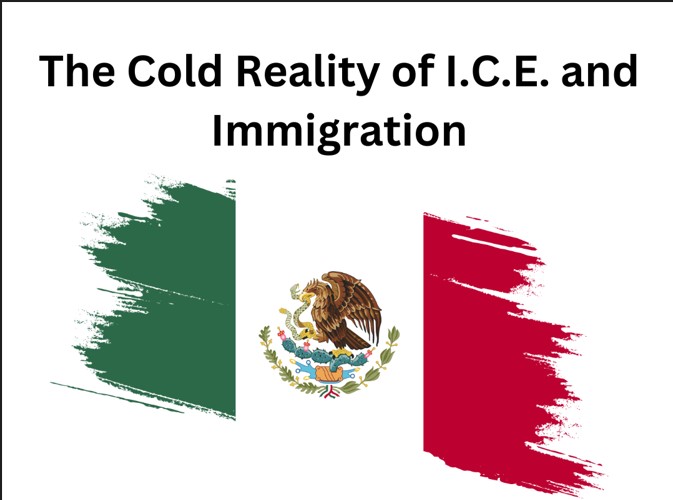Introduction
I.C.E., Immigration and Customs Enforcement is a federal law enforcement agency under the U.S. Department of Homeland Security. The increase in deportation following the recent inauguration of President Donald Trump has brought fear and discomfort to the general public. Know your rights, and stay educated.
Knowing your rights.
Even if undocumented, every single person living in the U.S. has basic rights. Knowing your constitutional rights is important for keeping yourself and others safe.
Every U.S citizen has rights here in the United States of America, even if you are undocumented, you still have rights. If I.C.E shows up on your doorstep or workplace, know your rights.
According to American Civil Liberties Union (ACLU):
Right to Remain Silent (Fifth Amendment)
- You have the right to remain silent, even if an officer has a warrant.
- You always have the U.S. Constitution – Fifth Amendment right to remain silent.
Right to Refuse Entry Without a Warrant
- If an officer comes to your door, you do NOT have to let police or immigration agents into your home unless they have a warrant with your name or the name of someone in your household and your correct address on it.
- The warrant must be issued by a court and signed by a judge.
Right to Protect Your Home
- If police have an arrest warrant, they are legally allowed to enter the home of the person on the warrant, if they believe that person is inside.
- If you let I.C.E. agents and/or officers into your home to make the arrest, then they are allowed to question anyone else who may be in the home.
Right to Refuse Questioning
- If you are arrested by I.C.E, remember that you have the right to remain silent and ask to speak to a lawyer.
- Do not answer or sign anything until you have spoken to a lawyer. Remember that you also have the right to a phone call, if you already have an immigration lawyer or a lawyer, and remember their number, call that number and make them aware of your arrest, if you do not have or remember the number, call a trusted family member to do so for you. Officers and agents must contact your consulate officials to tell them that you have been arrested.
Protecting your home.
- A warrant of removal/deportation (Form I-205) does not allow officers to enter a home without consent.
- These are your rights according to American Civil Liberties Union (ACLU). If they persist in entering your home, Say, “I do not consent to your entry” through the door or window and keep the door closed.
What if Officers Claim to Have a Warrant?
- If they have any information, ask them to leave it at your doorstep. If officers claim to have a signed warrant from a judge, ask them to slide the warrant under the door so you can read it.
- When you receive the warrant, make sure the warrant has: 1. your name or the name of the person in your home, 2. your correct address and 3. the signature of a judge on it.
- If it does not or is missing any of these things, tell the agents or officers that the warrant is illegal and you will not be opening your door.
- If the officer or agent forces their way into your home without a valid warrant or your consent, do not run or resist, remain calm. Instead, start recording and take photos (you have the right, according to ACLU, to record), while saying “I do not consent to you being in my home. Please leave.”
- They may continue to force their way into your home, but saying this to them can help your immigration case in the future.
Suppose the warrant has your correct name and address, was issued by a court, and signed by a judge. In that case, you must allow them to enter, inform the agents or officers about any children, elderly, or other vulnerable people in the home, remember to remain silent and calm. You have the right to remain silent and not answer any questions or discussions about your citizenship status or immigration. Do NOT tell the agents or officers about where you were born, how you entered the United States or your immigration status. Instead you can say, “I choose to remain silent and would like to speak to a lawyer before answering any questions”.
The Moral & Legal Definition of a Sanctuary Zone.
What is a Sanctuary zone?
You may have heard the term “Sanctuary zone” or “Safe Zone” when discussing the topic of deportation. A common misconception is that a sanctuary zone is a government policy put in place to provide temporary refuge in schools, hospitals, and churches. Although it has been publicly considered this in the past, it is not true. An article from Global Refuge.org says, “There is no official definition of what constitutes a “sanctuary city” or state/jurisdiction. In general, it refers to a policy that limits or defines the extent to which a local/state government will share information with federal immigration law officers.”
Schools are considered sanctuary zones by the general public, but that does not require a change in action from a police or ICE officer. Still, students are protected while at school. According to the Supreme Court case Plyler V. Doe, Texas (1982), “ A state cannot prevent children of undocumented immigrants from attending public school unless a substantial state interest is involved.” Proving that a child’s education should not be dismissed because of factors outside of their control – in this case it’s the immigration status of parents.
The Effects of I.C.E.
During an interview with Newsweek, an ICE spokesperson claimed that “U.S. Immigration and Customs Enforcement has not conducted any operations at schools or bus stops. Our enforcement efforts remain focused on public safety threats and those who have a final order of removal.”
As we know already, ICE has been around for years. In March 2003, the Homeland Security Act set into motion what would be the single-largest government reorganization since the creation of the Department of Defense. ICE. Over time ICE’s primary mission is to promote homeland security and public safety through the criminal and civil enforcement of federal laws governing border control, customs, trade and immigration.
According to Migrationpolicy.org “The 1.1 million deportations since the beginning of fiscal year (FY) 2021 through February 2024 (the most recent data available) are on pace to match the 1.5 million deportations carried out during the four years President Donald Trump was in office.” As of today, we hear more and more about ICE every day, whether it’s on the news or it’s brought up at school or even as far as social media. Social Media has a huge impact on people nowadays, we have all these different social media apps such as Instagram, TikTok, Facebook, Twitter, and so much more. People express varied public reactions to the mass deportation going on. Not only do the people express their public reaction on the internet but they also showcase it at protests.
Protest means to show or express strong disagreement with or disapproval of something. With this being said, there have been many protests against the mass deportation, with just a month ago, on February 2, Fox News reports that a Downtown L.A. protest was being held and demonstrators had started streaming onto the 101 Freeway near City Hall, bringing Sunday afternoon traffic to a standstill. Protestors were crowding overpasses, where they were waving Mexican flags and holding signs. Of course police were involved but did not do anything about the protest as they hadn’t shown any signs of violence. Many photos and videos were shared on this news report from Fox News of this protest and even on social media.
In conclusion, the issue of deportation and the role of I.C.E. in enforcing immigration laws has become a deeply divisive topic in the United States. While powerful emotions of deportation affect many, it is crucial for individuals, especially those undocumented, to know and assert their rights to protect themselves. Understanding basic constitutional rights such as the right to remain silent, refuse entry without a warrant, and protect one’s home is vital in ensuring personal safety during interactions with I.C.E. or law enforcement. Ultimately, the protection of basic human rights and access to legal counsel remains essential as the debate over immigration policies continues to evolve.



























